Related Research Articles
Blues is a music genre and musical form which was originated in the Deep South of the United States around the 1860s by African-Americans from roots in African-American work songs, and spirituals. Blues incorporated spirituals, work songs, field hollers, shouts, chants, and rhymed simple narrative ballads. The blues form, ubiquitous in jazz, rhythm and blues and rock and roll, is characterized by the call-and-response pattern, the blues scale and specific chord progressions, of which the twelve-bar blues is the most common. Blue notes, usually thirds, fifths or sevenths flattened in pitch are also an essential part of the sound. Blues shuffles or walking bass reinforce the trance-like rhythm and form a repetitive effect known as the groove.
Rhythm and blues, often abbreviated as R&B or R'n'B, is a genre of popular music that originated in African-American communities in the 1940s. The term was originally used by record companies to describe recordings marketed predominantly to urban African Americans, at a time when "urbane, rocking, jazz based music with a heavy, insistent beat" was becoming more popular. In the commercial rhythm and blues music typical of the 1950s through the 1970s, the bands usually consisted of piano, one or two guitars, bass, drums, one or more saxophones, and sometimes background vocalists. R&B lyrical themes often encapsulate the African-American experience of pain and the quest for freedom and joy, as well as triumphs and failures in terms of relationships, economics, and aspirations.

Doo-wop is a genre of rhythm and blues music that originated among African-American youth in the 1940s, mainly in the large cities of the United States, including New York, Philadelphia, Chicago, Baltimore, Newark, Detroit, Washington, DC, and Los Angeles. It features vocal group harmony that carries an engaging melodic line to a simple beat with little or no instrumentation. Lyrics are simple, usually about love, sung by a lead vocal over background vocals, and often featuring, in the bridge, a melodramatically heartfelt recitative addressed to the beloved. Harmonic singing of nonsense syllables is a common characteristic of these songs. Gaining popularity in the 1950s, doo-wop was "artistically and commercially viable" until the early 1960s, but continued to influence performers in other genres.
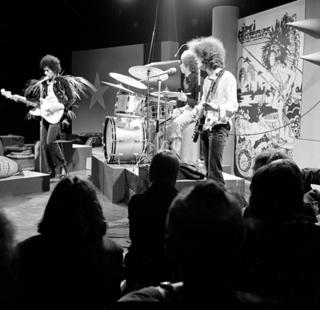
A power trio is a rock and roll band format having a lineup of electric guitar, bass guitar and drum kit, leaving out the second rhythm guitar or keyboard instrument that are used in other rock music bands that are quartets and quintets. Larger rock bands use one or more additional rhythm section to fill out the sound with chords and harmony parts.

The Coasters are an American rhythm and blues/rock and roll vocal group who had a string of hits in the late 1950s. Beginning with "Searchin'" and "Young Blood" in 1956, their most memorable songs were written by the songwriting and producing team of Leiber and Stoller. Although the Coasters originated outside of mainstream doo-wop, their records were so frequently imitated that they became an important part of the doo-wop legacy through the 1960s. The Coasters holds the distinction of being the first group inducted into The Rock And Roll Hall Of Fame.
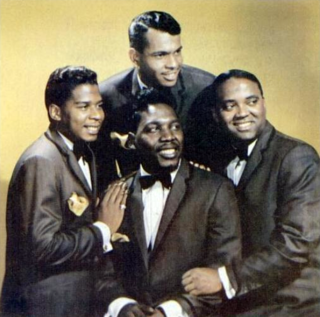
The Drifters are an American doo-wop and R&B/soul vocal group. They were originally formed as a backing group for Clyde McPhatter, formerly the lead tenor of Billy Ward and his Dominoes in 1953.

Coleman Randolph Hawkins, nicknamed "Hawk" and sometimes "Bean", was an American jazz tenor saxophonist. One of the first prominent jazz musicians on his instrument, as Joachim E. Berendt explained: "there were some tenor players before him, but the instrument was not an acknowledged jazz horn". Hawkins biographer John Chilton described the prevalent styles of tenor saxophone solos prior to Hawkins as "mooing" and "rubbery belches." Hawkins cited as influences Happy Caldwell, Stump Evans, and Prince Robinson, although he was the first to tailor his method of improvisation to the saxophone rather than imitate the techniques of the clarinet. Hawkins' virtuosic, arpeggiated approach to improvisation, with his characteristic rich, emotional, and vibrato-laden tonal style, was the main influence on a generation of tenor players that included Chu Berry, Charlie Barnet, Tex Beneke, Ben Webster, Vido Musso, Herschel Evans, Buddy Tate, and Don Byas, and through them the later tenormen, Arnett Cobb, Illinois Jacquet, Flip Phillips, Ike Quebec, Al Sears, Paul Gonsalves, and Lucky Thompson. While Hawkins became known with swing music during the big band era, he had a role in the development of bebop in the 1940s.
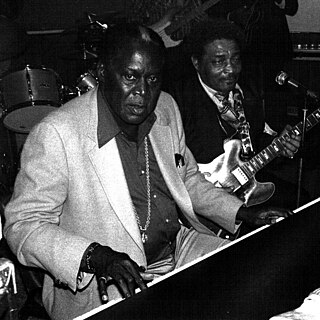
Memphis Slim was an American blues pianist, singer, and composer. He led a series of bands that, reflecting the popular appeal of jump blues, included saxophones, bass, drums, and piano. A song he first cut in 1947, "Every Day I Have the Blues", has become a blues standard, recorded by many other artists. He made over 500 recordings.

Eugene "Jug" Ammons, also known as "The Boss", was an American jazz tenor saxophonist. The son of boogie-woogie pianist Albert Ammons, Gene Ammons is remembered for his accessible music, steeped in soul and R&B.

James Peter Giuffre was an American jazz clarinetist, saxophonist, composer, and arranger. He is known for developing forms of jazz which allowed for free interplay between the musicians, anticipating forms of free improvisation.

James Emory Garrison was an American jazz double bassist. He is best remembered for his association with John Coltrane from 1961 to 1967.
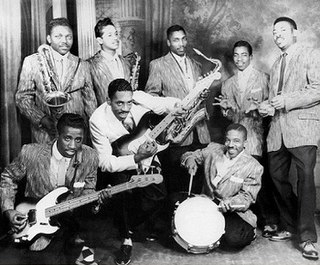
The Kings of Rhythm are an American rhythm and blues and soul group formed in the late 1940s in Clarksdale, Mississippi and led by Ike Turner through to his death in 2007. Turner would retain the name of the band throughout his career, although the group has undergone considerable line-up changes over time.

Benjamin Francis Webster was an American jazz tenor saxophonist.

John Arnold Griffin III was an American jazz tenor saxophonist. Nicknamed "the Little Giant" for his short stature and forceful playing, Griffin's career began in the mid-1940s and continued until the month of his death. A pioneering figure in hard bop, Griffin recorded prolifically as a bandleader in addition to stints with pianist Thelonious Monk, drummer Art Blakey, in partnership with fellow tenor Eddie "Lockjaw" Davis and as a member of the Kenny Clarke/Francy Boland Big Band after he moved to Europe in the 1960s. In 1995, Griffin was awarded an Honorary Doctorate of Music from Berklee College of Music.
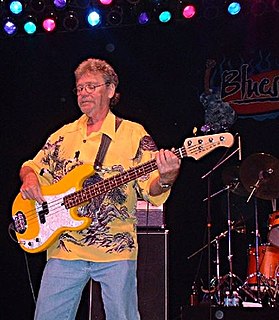
Donald "Duck" Dunn was an American bass guitarist, session musician, record producer, and songwriter. Dunn was notable for his 1960s recordings with Booker T. & the M.G.'s and as a session bassist for Stax Records. At Stax, Dunn played on thousands of records, including hits by Otis Redding, Sam & Dave, Rufus Thomas, Carla Thomas, William Bell, Eddie Floyd, Johnnie Taylor, Albert King, Bill Withers, Elvis Presley and many others. In 1992, he was inducted in the Rock and Roll Hall of Fame as a member of Booker T. & the M.G.'s. He is ranked number 40 on Bass Player magazine's list of "The 100 Greatest Bass Players of All Time".

Gene Chandler is an American singer, songwriter, music producer, and record-label executive. Chandler is nicknamed "the Duke of Earl" or, simply, "the Duke." He is best known for his most successful songs, "Duke of Earl" and "Groovy Situation", and his association with the Dukays, the Impressions, and Curtis Mayfield.
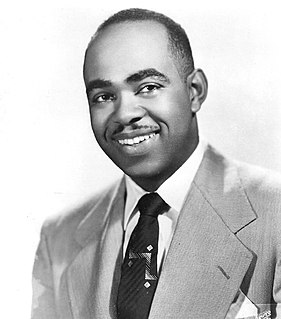
Wild Bill Davis was the stage name of American jazz pianist, organist, and arranger William Strethen Davis. He is best known for his pioneering jazz electronic organ recordings and for his tenure with the Tympany Five, the backing group for Louis Jordan. Prior to the emergence of Jimmy Smith in 1956, Davis was the pacesetter among organists.
"I Pity the Fool" is a soul blues song originally recorded by Bobby Bland in 1961 for his first Duke Records album, Two Steps from the Blues. Many music writers believe it was written by Joe Medwick, although Duke owner Don Robey appears on the songwriting credits.
The Showmen were a New Orleans-based American doo-wop and R&B group formed in 1961. They are best remembered for their track "It Will Stand", issued on Minit Records. "It Will Stand" reached #61 on the Billboard Hot 100 in 1961, and when re-released in 1964 re-charted and reached #80. They had another hit, the Carolina Beach Music standard "39-21-40 Shape;" the label on the single, however, was mistakenly printed "39-21-46," and this soon supplanted the official title.
Fred Jackson is an American rhythm and blues and jazz tenor saxophonist.
References
- 1 2 "The Sheppards | Biography & History". AllMusic . Retrieved January 31, 2020.
- ↑ Edward Komara; Peter Lee, eds. (2004). Blues Encyclopedia. Routledge. p. 877. ISBN 978-1135958329.
Bill Bunky Sheppard began working with doo-wop groups in Chicago during the 1950s, independently producing such acts as the Sheppards and the Bel Aires. He operated the Apex label (1959–1962), on which he recorded Danny .
- ↑ Robert Pruter (1992). Chicago Soul. University of Illinois Press. p. 51. ISBN 978-0252062599.
Sheppard was getting some success on the successor group of the Bel Aires called the Sheppards, so Davis teamed up with him to form Pam Productions in 1961. The Sheppards are highly regarded today by those familiar with the group's music, but by and large they remain unknown to the vast majority of rhythm-and-blues fans. Their relative obscurity perhaps can be attributed to the fact that they were popular during the long-denigrated early- 1960s era of rock 'n' roll, when doowop was largely a memory and soul had a few years to go before it would make its impact.